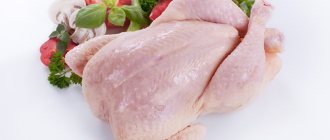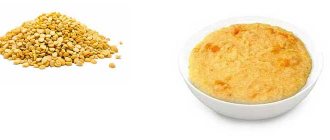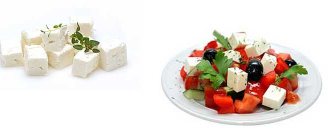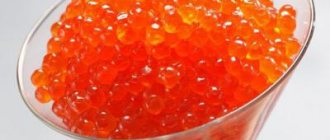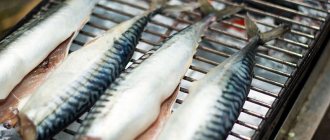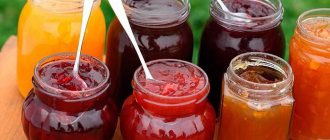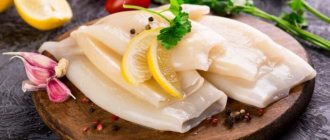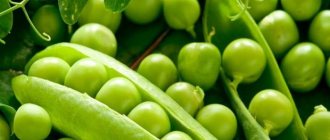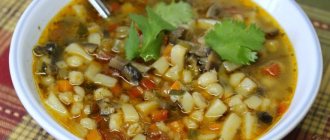Related Products
Chili soup (57 cal) Carrot coriander soup (100 cal) Lentil soup (54 cal) Vegetable soup (41 cal) Clear soup (8 cal) Chicken soup (60 cal) Potato soup (63 cal) ) Mushroom soup (51 kcal.) Tomato soup (43 kcal.) Bean soup (74 kcal.) Fish soup (ear) (16 kcal.) Turtle soup (53 kcal.) Onion soup (44 kcal.) Noodle soup ( 35 cal) Beef soup (50 cal) Vegetable pasta soup (44 cal) Broccoli soup (60 cal) Homemade soups (22 cal) Turkey soup (38 cal) Cream soups (52 kcal.) Meat soup (50 kcal.) Oyster stew soup (40 kcal.) Chinese soup (33 kcal.) Shark fin soup (46 kcal.) Cheese soup (76 kcal.)
How many calories are in a bowl of pea soup?
Peas themselves are not the most high-calorie product. 100 g of fresh green peas contains only 55 kcal, canned peas contain even less - 40 kcal, but they can be saturated with sugar. But dried whole grains, from which soup is mainly made, already contain 298 kcal in a 100-gram serving. However, they are used relatively little, since in the process the grains swell and become larger. Plus, proper pea soup still has a fair amount of broth.
Classic pea soup usually contains potatoes, so it has a considerable calorie content, and at the same time, it also contains starch. 100 g of soup contains approximately 65 kcal. If you want to get a dietary dish, remove potatoes from the food list. There will be about 40-45 kcal left.
If you prepare soup exclusively with peas with potatoes, onions, herbs and carrots, you get a vegetable composition that has a relatively low energy value: about 60-70 kcal per 100 g. The indicator is relevant for the ratio of water and food - 2:1. If there is less broth, the serving will have more calories.
Composition of nutrients, BJU
Pea soup
| For quantity: 100 grams | ||
| Calories — 67 | Calories from fat - 14 | |
| BJU | ||
| Total fat content | 1.5g | |
| Saturated | 0.7g | |
| Polyunsaturated | 0.16g | |
| Monounsaturated | 0.53g | |
| Cholesterol | 2mg | |
| Total carbohydrate content | 10.54g | |
| Dietary fiber | 2g | |
| Sugar | 3.53g | |
| Squirrels | 3.34g | |
| Vitamins and microelements | ||
| A - 3 µg | C - 0.57 mg | |
| B-6 – 0.03 mg | B-12 - 0.06mcg | |
| D - 0mcg | E - 0.09 mg | |
| Calcium 29mkg | Iron 0.81 mg | |
| Magnesium 17.33 mg | Zinc 0.66mg | |
| Potassium 97 mg | Sodium 212 mg | |
Distribution of calories for BJU:Carbohydrates (61%) Fats (20%) Proteins (19%) | ||
Product calculator
Enter the amount of Pea Soup to calculate its nutritional value
| Property | Meaning | % of normal | |
| Calorie content, kcal | 54,3 | 2.7 | 2.7% |
| Proteins, g | 2,2 | 1.33 | 1.33% |
| Carbohydrates, g | 5 | 2 | 2% |
| Fats, gr | 3 | 6.82 | 6.82% |
Calorie content Pea soup. Chemical composition and nutritional value.
Nutritional value and chemical composition of “Pea soup”.
The table shows the nutritional content (calories, proteins, fats, carbohydrates, vitamins and minerals) per 100 grams of edible portion.
| Nutrient | Quantity | Norm** | % of the norm in 100 g | % of the norm in 100 kcal | 100% normal |
| Calorie content | 61 kcal | 1684 kcal | 3.6% | 5.9% | 2761 g |
| Squirrels | 3.2 g | 76 g | 4.2% | 6.9% | 2375 g |
| Fats | 1.1 g | 56 g | 2% | 3.3% | 5091 g |
| Carbohydrates | 10 g | 219 g | 4.6% | 7.5% | 2190 g |
| Alimentary fiber | 1.1 g | 20 g | 5.5% | 9% | 1818 |
| Water | 89.1 g | 2273 g | 3.9% | 6.4% | 2551 g |
| Ash | 0.4 g | ~ | |||
| Vitamins | |||||
| Vitamin A, RE | 69 mcg | 900 mcg | 7.7% | 12.6% | 1304 g |
| alpha carotene | 313 mcg | ~ | |||
| beta carotene | 0.674 mg | 5 mg | 13.5% | 22.1% | 742 g |
| Lutein + Zeaxanthin | 40 mcg | ~ | |||
| Vitamin B1, thiamine | 0.017 mg | 1.5 mg | 1.1% | 1.8% | 8824 g |
| Vitamin B2, riboflavin | 0.032 mg | 1.8 mg | 1.8% | 3% | 5625 g |
| Vitamin B4, choline | 6.4 mg | 500 mg | 1.3% | 2.1% | 7813 g |
| Vitamin B6, pyridoxine | 0.037 mg | 2 mg | 1.9% | 3.1% | 5405 g |
| Vitamin B9, folates | 5 mcg | 400 mcg | 1.3% | 2.1% | 8000 g |
| Vitamin B12, cobalamin | 0.12 mcg | 3 mcg | 4% | 6.6% | 2500 g |
| Vitamin C, ascorbic acid | 1 mg | 90 mg | 1.1% | 1.8% | 9000 g |
| Vitamin D, calciferol | 0.1 mcg | 10 mcg | 1% | 1.6% | 10000 g |
| Vitamin D3, cholecalciferol | 0.1 mcg | ~ | |||
| Vitamin E, alpha tocopherol, TE | 0.51 mg | 15 mg | 3.4% | 5.6% | 2941 g |
| Vitamin K, phylloquinone | 6.9 mcg | 120 mcg | 5.8% | 9.5% | 1739 |
| Vitamin RR, NE | 0.293 mg | 20 mg | 1.5% | 2.5% | 6826 g |
| Macronutrients | |||||
| Potassium, K | 71 mg | 2500 mg | 2.8% | 4.6% | 3521 g |
| Calcium, Ca | 12 mg | 1000 mg | 1.2% | 2% | 8333 g |
| Magnesium, Mg | 15 mg | 400 mg | 3.8% | 6.2% | 2667 g |
| Sodium, Na | 16 mg | 1300 mg | 1.2% | 2% | 8125 g |
| Sera, S | 16 mg | 1000 mg | 1.6% | 2.6% | 6250 g |
| Phosphorus, P | 24 mg | 800 mg | 3% | 4.9% | 3333 g |
| Microelements | |||||
| Iron, Fe | 0.7 mg | 18 mg | 3.9% | 6.4% | 2571 g |
| Copper, Cu | 279 mcg | 1000 mcg | 27.9% | 45.7% | 358 g |
| Selenium, Se | 1.4 mcg | 55 mcg | 2.5% | 4.1% | 3929 g |
| Zinc, Zn | 0.22 mg | 12 mg | 1.8% | 3% | 5455 g |
| Digestible carbohydrates | |||||
| Mono- and disaccharides (sugars) | 1.72 g | max 100 g | |||
| Sterols (sterols) | |||||
| Cholesterol | 4 mg | max 300 mg | |||
| Saturated fatty acids | |||||
| Saturated fatty acids | 0.278 g | max 18.7 g | |||
| 12:0 Lauric | 0.001 g | ~ | |||
| 14:0 Miristinovaya | 0.004 g | ~ | |||
| 16:0 Palmitinaya | 0.2 g | ~ | |||
| 18:0 Stearic | 0.068 g | ~ | |||
| Monounsaturated fatty acids | 0.425 g | min 16.8 g | 2.5% | 4.1% | |
| 16:1 Palmitoleic | 0.014 g | ~ | |||
| 18:1 Oleic (omega-9) | 0.404 g | ~ | |||
| 20:1 Gadoleic (omega-9) | 0.005 g | ~ | |||
| Polyunsaturated fatty acids | 0.9 g | from 11.2 to 20.6 g | 8% | 13.1% | |
| 18:2 Linolevaya | 0.792 g | ~ | |||
| 18:3 Linolenic | 0.103 g | ~ | |||
| 20:4 Arachidonic | 0.002 g | ~ | |||
| Omega-3 fatty acids | 0.104 g | from 0.9 to 3.7 g | 11.6% | 19% | |
| 22:6 Docosahexaenoic acid (DHA), Omega-3 | 0.001 g | ~ | |||
| Omega-6 fatty acids | 0.794 g | from 4.7 to 16.8 g | 16.9% | 27.7% |
The energy value of pea soup is 61 kcal.
Primary Source: Created in the application by the user. Read more.
** This table shows the average levels of vitamins and minerals for an adult. If you want to know the norms taking into account your gender, age and other factors, then use the “My Healthy Diet” application.
General tips and tricks
- Crushed peas are cooked for forty-five minutes or more, and whole ones for almost an hour and a half. Before cooking, soak the peas for twelve hours. While cooking the peas, add a little sunflower oil or butter.
- Remember that peas are a healthy food and, therefore, have their contraindications. Typically, peas are contraindicated for people suffering from acute nephritis, gout, inflammation of the stomach and intestinal diseases.
- Peas are allowed to be eaten for ulcers and diseases of the duodenum, but only in pureed form, in the form of puree soup.
- To avoid gas and bloating, add carrots, and eat the dish itself with bread.
And the last thing! Eat pureed pea soup for your health, and if you are afraid of gaining excess weight, it is best to give up sweets, flour and fatty foods, and also go in for sports! Good luck!
Ingredients Pea Soup
| water | 1500.0 (gram) |
| peas | 1.0 (grain glass) |
| bulb onions | 1.0 (piece) |
| carrot | 1.0 (piece) |
| table salt | 3.0 (gram) |
| butter | 1.0 (tablespoon) |
| sour cream | 100.0 (gram) |
| green onion | 50.0 (gram) |
| dill | 50.0 (gram) |
It is advisable to soak the peas in cold water in the evening. Boil peas in 1.5 liters of water until tender. Sauté finely chopped onions and carrots in butter for 3 minutes. Add sautéed vegetables and salt to the boiling pea broth. Boil for 5 minutes. Serve with herbs and sour cream.
Recipe for making pea soup step by step
Step 1. Pour the peas into a pan, sort them out and rinse very thoroughly in at least 10 waters. Use cool water.
Step 2. Pour cool, filtered water over the peas until they are completely covered and leave them to swell for two hours.
Step 3. Clean the chilled chicken breast from skin and excess fat, wash it under the tap and set to cook in water. If the chicken is frozen, then it is better to wait until it defrosts, then it will cook evenly.
Step 4. Peel the carrots and onions, cut them into small cubes and fry in a frying pan until golden brown.
Step 5. After the chicken is cooked, take it out onto a plate and strain the broth through a sieve or cheesecloth to avoid any chicken bone fragments.
Step 6. Separately, cook the peas until they are soft. In time, this will take about 15-20 minutes, provided that it was pre-soaked for 2 hours.
Step 7. Pour the peas along with the water in which they were boiled into the broth, put them on the stove, when they boil, switch them to medium heat.
Step 8. Peel the potatoes and cut them into medium cubes and put them in the broth with the peas. Remove the foam from the top.
Step 9. Throw in the sautéed carrots, onions and salt. The soup should not boil, it should seem to infuse and gurgle a little.
Step 10. Remove the bones from the chicken breast, cut into medium cubes and add to the soup, stir. At the end, add finely chopped greens.
Step 11. Switch to the lowest heat and close the lid. Once the potatoes are cooked, remove them from the stove and let them sit for another 15-20 minutes so that all the ingredients can combine the flavors.
Dietary properties:
How many calories are in pea soup, what dietary properties it has, all this is of great interest to those who are trying to lead a healthy lifestyle, monitor their health and figure. So we will try to answer these questions in the next article.
So here it is:
There is hardly a person who has never heard of such a dish as pea soup. Today many neglect it, but in vain! It has excellent taste and is healthy at the same time.
It would be difficult to overestimate the benefits of such a product as peas. This plant is a source of B vitamins, vitamin C and E, which help overcome depression, insomnia, normalize metabolic processes, and are useful for a number of cardiovascular diseases.
Peas contain a rich set of mineral components - magnesium, phosphorus, zinc.
And in terms of potassium content, peas are several times higher than other well-known vegetable crops. This is more than enough to normalize the potassium-sodium balance in those suffering from coronary heart disease and hypertension.
Pea soup is one of the most important suppliers of proteins (23%), fats (1.2%) and carbohydrates (52%) - without which, as we know, the life of the body is impossible. In addition, sugars in peas are represented by fructose and glucose, therefore, dishes made from them are allowed for consumption by patients with diabetes.
Classic pea soup with chicken
- water 1.5 l
- peas (crushed) 50 g
- chicken breast or fillet 200 g
- potatoes 2 pcs.
- carrots 1 pc.
- onion 1 pc.
- olive oil 2 tbsp. l.
- garlic 2 cloves
- bay leaf 1 pc.
- parsley 1/2 bunch
- salt to taste
- mixture of peppers to taste
Tip: to diversify the classic dish, you can add mushrooms to its recipe - they go well with poultry and will make the stew even more appetizing.
Ingredients
Number of ingredients: 9 Cooking time: 60 minutes Calories per 100 g: 55 kcal Proteins / fats / carbohydrates per 100 g: 3.2 / 1.5 / 6.9
All the ingredients for the recipe are available: I bought them in a small store near my house.
Set of products for the recipe
- Dried yellow peas - 200 grams (1 cup)
- Boiled-smoked pork ribs – 200 grams
- Potatoes - 330 grams (3 medium-sized pieces)
- Onions - 80 grams (1 piece)
- Carrots - 100 grams (1 piece)
- Vegetable oil - 7 grams
- Greens (dill) - 10 grams
- Bay leaf - 1 piece or 2 small ones
- Salt - to taste
I cook in a 3 liter pan, pouring 1.5 liters of water into it, I get about 2.4 liters of the former. This is 8-9 servings of 250-300 grams.
Dried peas come in yellow and green, whole and split (in halves). For the recipe, I use the yellow variety. Both chopped and whole will do. I have it in halves.
Legumes are quite high-calorie and filling foods, so for soup it is better to choose smoked meats without excess fat. Naturally, you can use any soup meat for the broth. However, the combination of smoke, which gives the first dish a special taste, is provided only by semi-finished meat products from the smokehouse.
You can use smoked chicken, pork, lamb or beef - almost any product from a smokehouse will do. The broth on the pork knuckle will be richer and richer, or fattier, as my dad used to say.
I prefer pork ribs, and I bought a small piece of meat weighing 200 grams in the store, its calorie content is 210 kcal per 100 grams, BZHU = 15/17/0.
